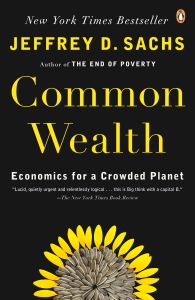Join getAbstract to access the summary!

Join getAbstract to access the summary!
Jeffrey D. Sachs
Common Wealth
Economics for a Crowded Planet
Penguin, 2009
What's inside?
Global warming, severe poverty – the outlook is grim. But with sacrifice and wisdom, humankind still can save the planet.
Recommendation
Famed economist Jeffrey Sachs manages to deliver pessimistic news in an optimistic way. Yes, the Earth faces dire threats from global warming, poverty, war, deforestation and mass extinctions. Yet Sachs asserts that these severe problems are manageable. Fixing them will cost $840 billion – a massive amount indeed, but, as Sachs argues, only 2.4% of the rich world’s gross national product. Sachs doesn’t shy away from politically touchy pronouncements. He argues against the U.S. war in Iraq and for legalized abortion. Still, throughout the fray, his book strikes the unlikely balance of delivering a message that’s both frightening and promising. getAbstract recommends this book to anyone seeking insight into the world’s most pressing problems.
Summary
About the Author
Internationally known economist Jeffrey Sachs directs The Earth Institute at Columbia University. He’s a special adviser to United Nations Secretary-General Ban Ki-moon on the U.N.’s Millennium Development Goals. Sachs also wrote The End of Poverty.


















Comment on this summary